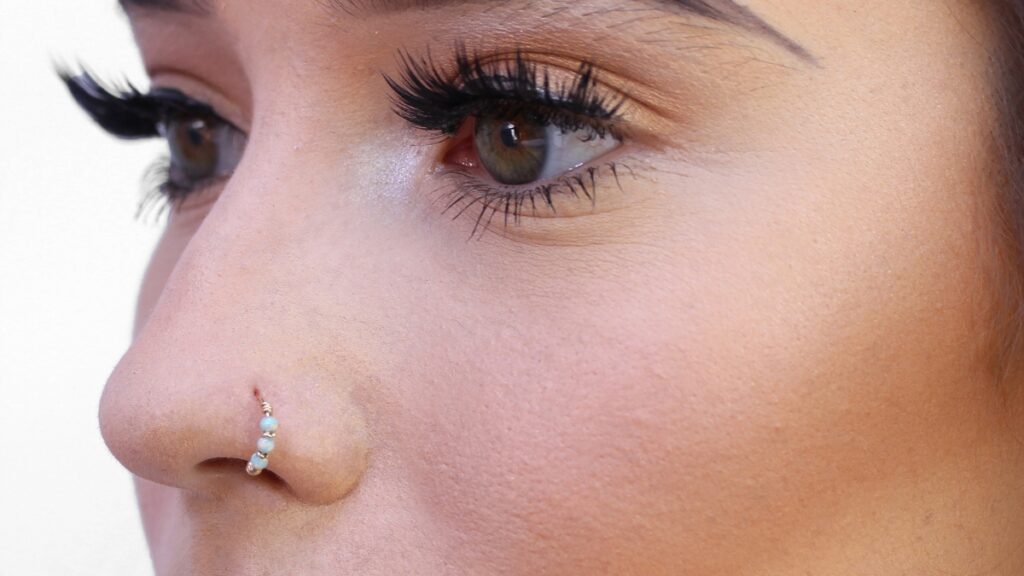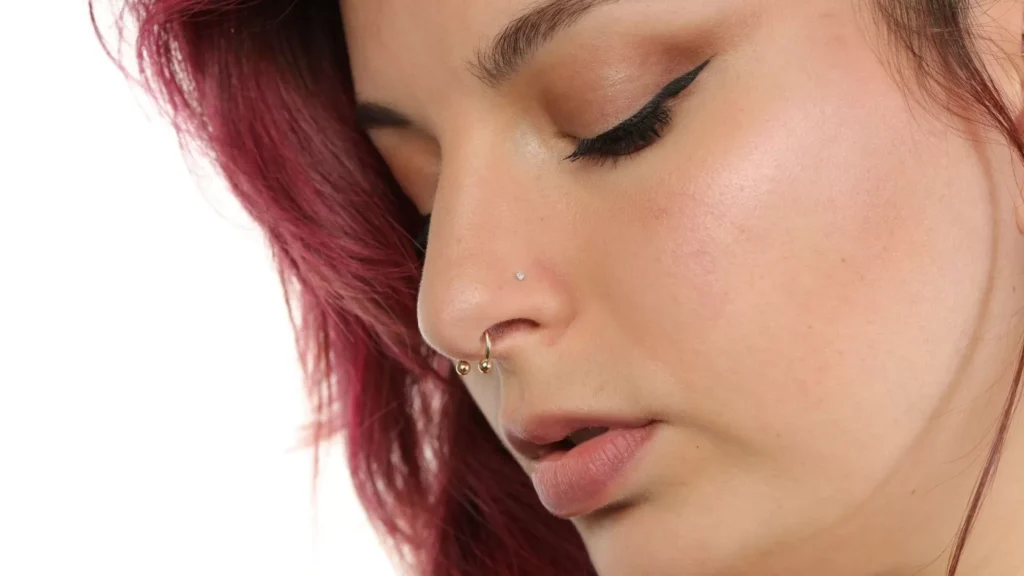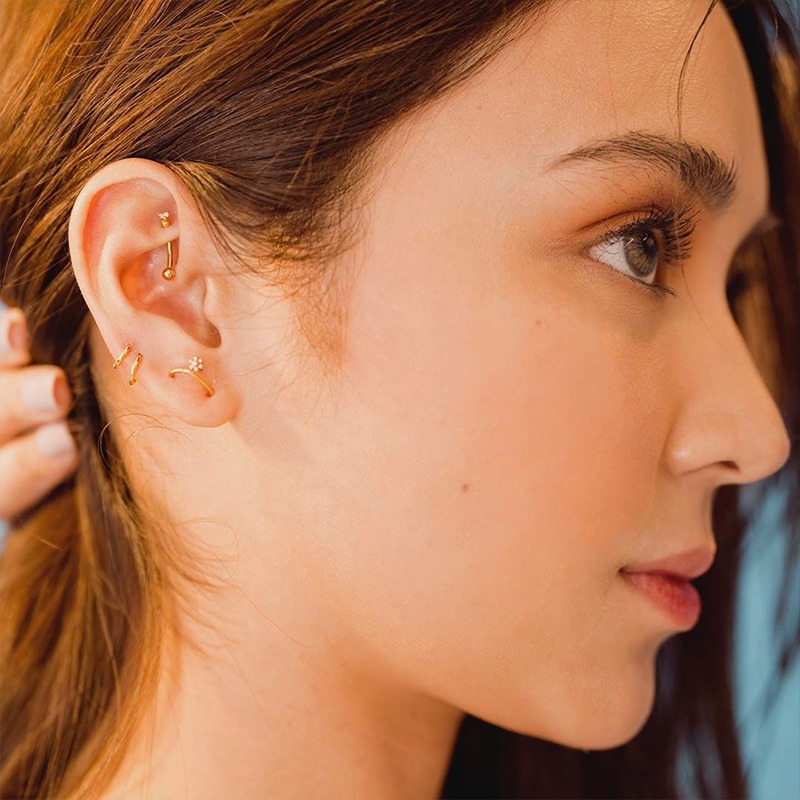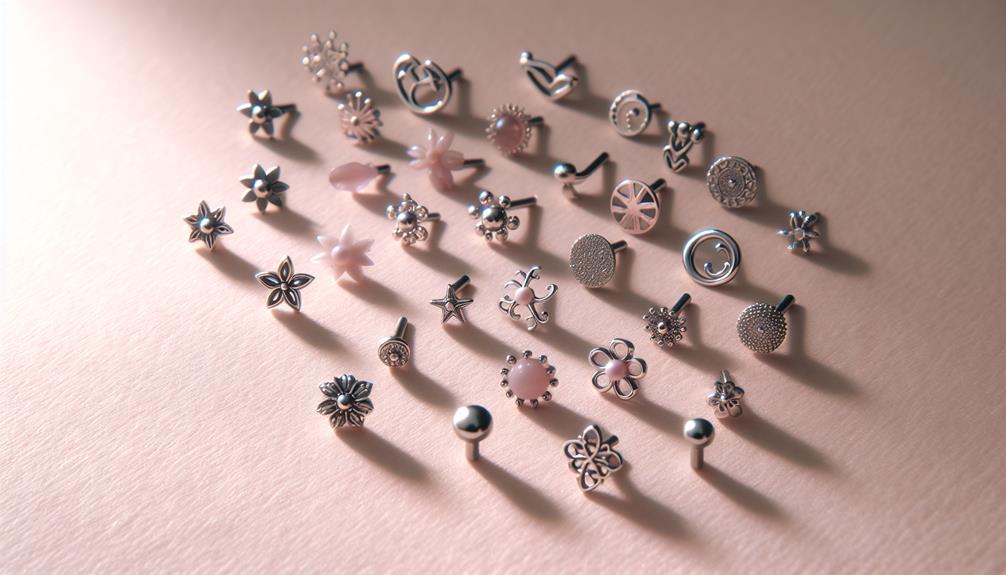Nose piercings have become increasingly popular in recent years, and it’s not uncommon for people to experience an unpleasant odor emanating from their piercing. While this smell can be concerning, it doesn’t necessarily mean that the piercing is infected. In fact, there are several reasons why a nose ring may smell.
One reason for the smell could be due to the accumulation of dead skin cells, oils, and bacteria around the piercing. This buildup can cause an unpleasant odor, even if the piercing is not infected. Another reason could be the type of jewelry being worn. Certain materials, such as nickel or copper, can react with the skin and cause an odor. It’s important to choose high-quality jewelry made from materials that are safe for the skin.
It’s essential to maintain proper hygiene practices to prevent infections and unpleasant smells. Regular cleaning of the piercing with saline solution or mild soap can help prevent bacteria buildup. If the smell persists or is accompanied by other symptoms, such as redness or swelling, it’s important to seek medical attention to rule out an infection.
Understanding Nose Ring Odor without Infactions
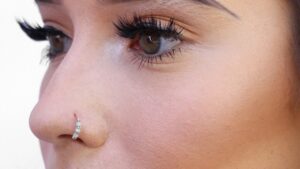
Causes of Nose Ring Smell
Nose rings are a popular form of body jewelry that can add a unique touch to a person’s appearance. However, some individuals may experience an unpleasant odor coming from their nose ring, even if it is not infected. There are several reasons why this may occur.
One of the most common causes of nose ring odor is the accumulation of dead skin cells, sebum, and sweat around the piercing site. This buildup can create a breeding ground for bacteria, which can produce a foul smell. Additionally, if the nose ring is not cleaned regularly, it can lead to the buildup of dirt and debris, which can also contribute to the odor.
Another cause of nose ring odor is the type of metal used in the nose ring. Some metals, such as copper and brass, can react with the skin’s natural oils and sweat, causing an unpleasant smell. Additionally, some individuals may have an allergic reaction to certain metals, which can also lead to odor.
Bacteria and Biofilm Formation
Bacteria and biofilm formation are also common causes of nose ring odor. When bacteria colonize around the piercing site, they can produce a biofilm, which is a slimy layer that can trap dirt, debris, and dead skin cells. This biofilm can create a strong odor and can be difficult to remove without proper cleaning.
To prevent nose ring odor, it is important to clean the piercing site regularly with saline solution or antibacterial soap. Additionally, it is recommended to avoid wearing nose rings made of metals that can react with the skin or cause an allergic reaction. By taking these steps, individuals can enjoy their nose ring without worrying about unpleasant odors.
Hygiene Practices
Proper Cleaning Techniques
One of the main reasons why nose rings may develop an unpleasant odor is due to inadequate cleaning. Proper cleaning techniques can help prevent the buildup of bacteria and debris that can cause odor.
To clean a nose ring, one should first wash their hands with soap and water. Then, using a saline solution, the nose ring should be gently cleaned. It is important to avoid using harsh chemicals or alcohol-based products as they can cause irritation and dryness.
Additionally, it is recommended to use a soft-bristled toothbrush to clean the area around the nose ring. This can help remove any buildup of dead skin cells and other debris that may contribute to the odor.
Frequency of Cleaning
Another important factor to consider is the frequency of cleaning. It is recommended to clean a nose ring at least once a day. However, if the individual engages in activities that cause them to sweat or come into contact with dirt and debris, then it may be necessary to clean the nose ring more frequently.
It is also important to note that certain materials may require more frequent cleaning than others. For example, if the nose ring is made of porous materials such as wood or bone, it may require more frequent cleaning to prevent the buildup of bacteria.
By following proper cleaning techniques and cleaning the nose ring regularly, individuals can prevent the buildup of bacteria and debris that can cause an unpleasant odor.
Material and Quality of Nose Rings
Types of Materials
The material used to make nose rings can have a significant impact on the odor it emits. Nose rings are typically made from a variety of materials, including stainless steel, titanium, gold, silver, and plastic.
Stainless steel and titanium nose rings are popular due to their durability and resistance to corrosion. Gold and silver nose rings are also common, but they can be more prone to tarnishing and require more maintenance. Plastic nose rings are often used for temporary wear or during the healing process after getting a new piercing.
Impact of Material on Odor
The material used to make a nose ring can impact the odor it emits. Some materials, such as stainless steel and titanium, are less likely to produce an odor than others. However, even high-quality nose rings can emit an odor due to factors such as sweat and bacteria buildup.
It is essential to clean your nose ring regularly, regardless of the material it is made from, to prevent an unpleasant odor. Proper cleaning can also help prevent infection and other complications. Using a gentle soap and warm water to clean your nose ring can help remove bacteria and buildup that can cause odor.
In conclusion, the material used to make a nose ring can impact the odor it emits. However, proper cleaning and maintenance can help prevent unpleasant odors and other complications.
Lifestyle and Environmental Factors
Diet and Hydration
The food and drinks that a person consumes can play a significant role in the smell of their nose ring. Eating spicy or pungent foods can cause a temporary change in the smell of the nose ring. Similarly, consuming alcohol or smoking can also affect the smell of the nose ring.
In addition to diet, hydration is also an important factor. Not drinking enough water can cause dehydration, which can lead to dryness in the nose and an increase in the smell of the nose ring. It is recommended to drink at least 8 glasses of water per day to maintain proper hydration levels.
Exercise and Sweat
Sweat can also contribute to the smell of a nose ring. When a person exercises, they produce sweat, which contains bacteria that can mix with the oils on the skin and cause an unpleasant odor. It is important to clean the nose ring after exercising to prevent the buildup of bacteria and sweat.
Furthermore, wearing tight-fitting clothing or hats can also contribute to the smell of the nose ring. This is because the tight clothing or hats can cause sweat to accumulate around the nose ring, leading to an increase in bacteria and odor.
In conclusion, lifestyle and environmental factors can contribute to the smell of a nose ring. Eating a healthy diet, staying hydrated, and cleaning the nose ring after exercising can help reduce the odor.
Troubleshooting Tips
When to Seek Professional Advice
If you have tried various home remedies and still experience a persistent odor from your nose ring, it may be time to seek professional advice. A healthcare provider or a professional piercer can examine your piercing and help identify the underlying cause of the odor.
In some cases, the odor may be due to an infection or an allergic reaction. Signs of an infection include redness, swelling, pain, and discharge from the piercing site. If you experience any of these symptoms, seek medical attention immediately.
Home Remedies to Reduce Odor
If you are experiencing a mild odor from your nose ring, there are several home remedies that you can try to reduce the smell:
- Clean your piercing regularly with saline solution or a mild soap.
- Avoid touching your piercing with dirty hands.
- Use tea tree oil or lavender oil to reduce the odor.
- Avoid wearing jewelry made from nickel or other metals that can cause an allergic reaction.
By following these simple steps, you can reduce the odor from your nose ring and keep your piercing healthy. If you experience any signs of infection or have concerns about your piercing, seek professional advice.

